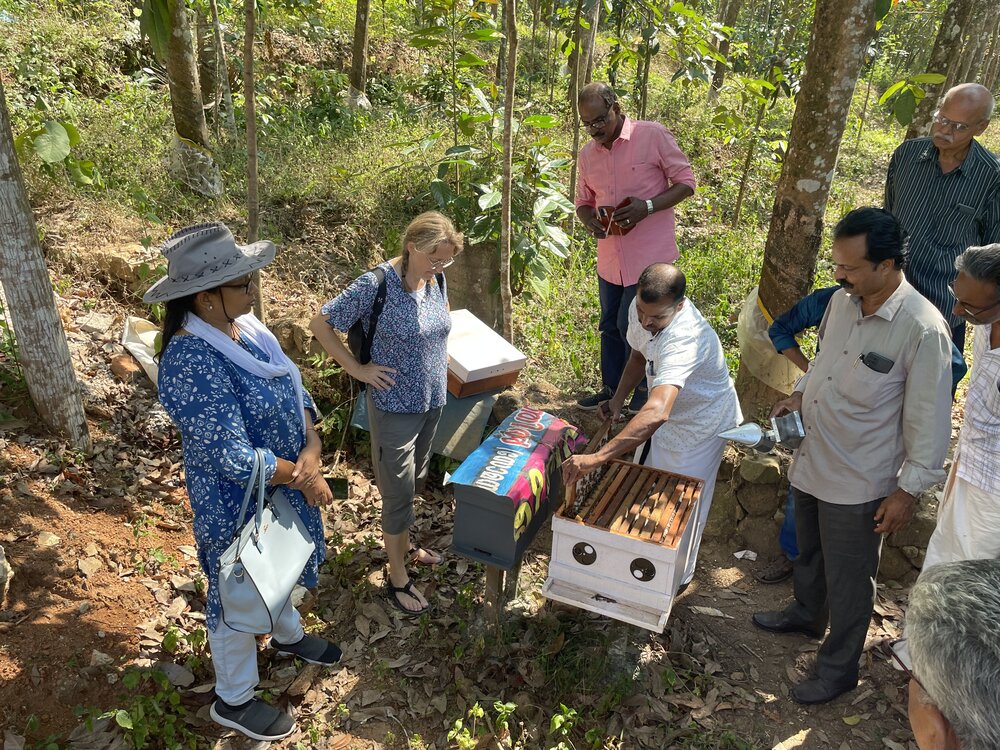How can beekeeping and biodiversity help smallholder farmers in Asia? A new SIANI expert group will explore how a greater focus on pollination services and bees can contribute to food security and livelihoods. The aim is to set up Living Labs in India, Laos, Nepal and Sri Lanka.
The decline in pollinators poses a severe risk to farmers all over the world and requires action. But there are also many encouraging examples of how changes in farming practices have increased biodiversity and stabilized bee populations. Against this backdrop, a new SIANI expert group has been created with the theme Pollination knowledge exchange for food, nutrition and livelihood security in South and Southeast Asia.
The group consists of experts from South and Southeast Asia and is coordinated by the Swedish University of Agricultural Sciences, SLU. We asked one of the coordinators, Lotta Fabricius Kristiansen, to tell us more.
What is your project about?
The overall aim is to develop a collaborative approach for the restoration and sustainable management of pollination services for smallholder farmers. Building on previous experiences from India and Sri Lanka, we will work with communities, including landowners, entrepreneurs, advisors and local authorities.
We will explore the potential for setting up a network of Living Labs in Sri Lanka, Southern India, Nepal and Laos to co-create, evolve and support the necessary land use transition within local communities. The knowledge gained can help us formulate innovative policy recommendations and practices that provide a sustainable platform for the recovery and conservation of pollination services in agricultural landscapes, while also looking at how beekeeping can contribute to improved livelihoods. This is important since there are still many knowledge gaps.
Who are the members of the expert group?
The group has 12 members – six men and six women – from India, Laos, Nepal and Sri Lanka. They have a broad range of expertise and come from different sectors of society, but they share the same interest in pollination, beekeeping and food production. We are also three colleagues from SLU.
What type of change can be achieved through your project?
In the short term, six local Living Labs in the four countries will co-create a more sustainable land management approach benefiting pollinators and pollination as an ecosystem service. We also want to explore how beekeeping can be an additional source of income for smallholder farmers. One idea is to produce guidelines on how beekeeping can be part of disaster risk reduction.
In the long term, the results from the Living Labs can contribute to a generic model and a universal tool for scaling up these practices. We hope that lessons from this project will increase awareness of multifunctionality and ecosystem services, including pollination and the crucial role of environmental quality and landscape heterogeneity in food system transformations. Our work can provide input to the emerging Asian Pollinator Initiative as well as the UN FAO/WFP Global Food Security Cluster.
Why is this important?
The decline in pollinators and biodiversity is a great cause for concern. Millions of smallholders throughout South and Southeast Asia get their food and income from producing crops that require pollination, for example fruits, nuts, vegetables and cash crops. These farmers can increase their food and nutrition security by shifting to practices that preserve or restore pollination. For some, beekeeping can also be a source of income.
We need policies and economic incentives that strengthen ecosystem services like pollination and ensure food security even when extreme weather events become increasingly more common. Hopefully, our expert group can contribute to this.
